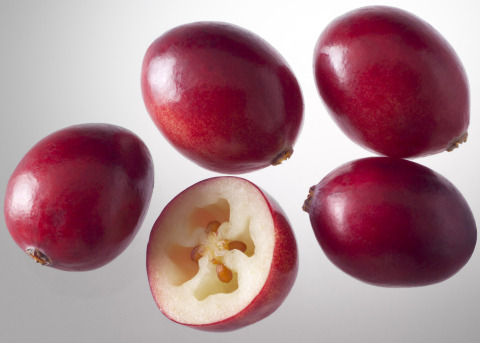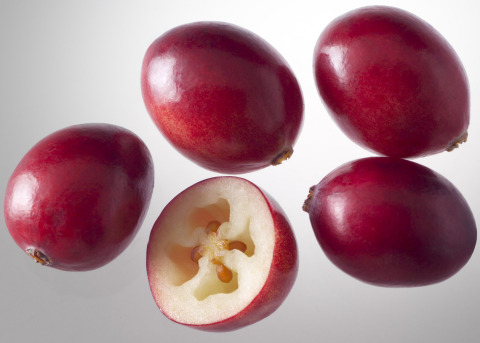LAKEVILLE-MIDDLEBORO, Mass.--(BUSINESS WIRE)--Experts from policy, academia and industry convened during a satellite session at the American Society for Nutrition’s 2013 Advances and Controversies in Clinical Nutrition Conference in Washington, D.C. Thursday, Dec. 5, to review new and existing evidence underscoring the positive effects of cranberry consumption. Long associated with urinary tract health, the latest research on the polyphenol-rich fruit bears weighty considerations in advance of the 2015 Dietary Guidelines for Americans.
Role of Cranberries in the American Diet, Worldwide
Among the presenters was David Baer, Ph.D., USDA-Agricultural Research Service Beltsville Human Nutrition Research Center, who discussed the role foods rich in polyphenols (plant compounds found in wine, tea and many common fruits, including cranberries) could play in enhancing diets and improving whole body health. Baer said research findings demonstrate the potential value of incorporating polyphenol-rich foods like cranberries into the diet, particularly as individuals worldwide struggle to meet suggested nutritional recommendations.
According to data presented at the session, simply adding eight ounces of cranberry juice per day or one serving of dried cranberries to consumers’ diets would nearly double the U.S. population’s intake of flavonoids, a category of polyphenols found in colorful fruits and vegetables linked to improved cardiovascular and cellular health as well as reduced inflammation.1
Rich in powerful nutrients like polyphenols, a hundred grams of cranberries contains more polyphenolic antioxidants than the equivalent amount of strawberries, broccoli, white grapes, bananas or apples.2
A Host of Whole Body Benefits
Featured presenters also touched on the role of cranberries in addressing urinary tract infections, the second most common bacterial infection, which poses a significant public health challenge in the U.S. With more than 15 million reported cases of urinary tract infections in the U.S. per year, the infection accounts for $8.28 billion in healthcare costs.3, 4
Kevin C. Maki, Ph.D., Biofortis, the clinical research arm of Mérieux NutriSciences, presented a review of more than 50 years of research connecting cranberry consumption to improved urinary tract health, illustrating that cranberry products are backed by many clinical trials, including some recent positive trials. Furthermore, a recent review published in Advances in Nutrition concluded that the connection between cranberries and decreased recurrence of urinary tract infections is important because a nutritional approach to the condition could lower the use of antibiotic treatment and the consequent development of resistance to these drugs.5
The ASN session also touched on lesser-known but important benefits of cranberry consumption, such as an emerging correlation between cranberries and improved heart health. Janet Novotny, Ph.D., USDA-Agricultural Research Service Beltsville Human Nutrition Research Center, presented findings based on a double blind placebo controlled clinical study which found that subjects drinking low calorie cranberry juice cocktail had significantly lower C-reactive protein and diastolic blood pressure than subjects on a placebo beverage.
Novotny noted that cranberries have long been studied for the positive impact on urinary tract health, but that more recent studies indicate that cranberries, because of their high concentrations of flavonoids, can help promote cardiometabolic markers and help maintain cardiovascular health, including lowering blood pressure.
Cranberries in a Balanced Diet, Healthy Lifestyle
Rounding out the symposium was a study using the CDC National Health and Nutrition Examination Survey (NHANES) data which found that adult (19+ years of age) cranberry juice consumers who drink an average of two glasses (14 fl. oz.) of cranberry juice over two non-consecutive days have better cardiometabolic profiles than those who do not consume the beverage.
Of note was the association between cranberry beverage consumption and lower waist circumference as well as the tendency to be less overweight or obese when compared to non-consumers of cranberry, showing that cranberry beverages can be consumed as part of a healthy, balanced lifestyle. In fact, of the groups evaluated, each demonstrated significantly lower odds of having high C-reactive protein levels, a marker of inflammation. Data from a controlled clinical trial presented at this meeting provided additional support for this finding.
“The correlation between cranberry juice consumption and its nutritive benefits are clear,” said Kiyah J. Duffey, Ph.D., Virginia Tech, who presented the NHANES findings. “While the data are preliminary, the results suggest that cranberry juice cocktail can provide positive benefits and be part of a healthy lifestyle.”
A video recording of the session will be posted in the coming weeks and will be available to dietitians for Continuing Professional Education (CPE) credits at http://www.nutrition.org.
For more information about the whole body health benefits of cranberries, visit www.cranberryhealth.com.
About Ocean Spray
Ocean Spray is a vibrant agricultural cooperative owned by more than 700 cranberry and grapefruit growers in the United States, Canada, and Chile who have helped preserve the family farming way of life for generations. Formed in 1930, Ocean Spray is now the world’s leading producer of cranberry juices, juice drinks and dried cranberries, and is the best-selling brand in the bottled juice category. The cooperative’s cranberries are currently featured in more than 1,000 great-tasting, good-for-you products in over 50 countries worldwide. With more than 2,000 employees and nearly 20 cranberry receiving and processing facilities, Ocean Spray is committed to managing our business in a way that respects our communities, employees and the environment. In fiscal year 2012, Ocean Spray posted record-high gross sales of $2.2 billion and net proceeds of $338 million.
1 Chun OK, Floegel A, Chung SJ, Chung CE, Song WO, et al. (2010) Estimation of antioxidant intakes from diet and supplements in U.S. adults. J Nutr 140: 317–324.
2 Bhagwat SA, Haytowitz DB, Holden JM. USDA Database for the Flavonoid Content of Selected Foods, Release 3.1, 2013. U.S. Department of Agriculture, Agricultural Research Service Nutrient Data Laboratory Home Page: https://www.ars.usda.gov/Services/docshtm?docid=6231
3 Griebling TL. Urinary Tract Infections in Women. In: Litwin MS, Saigal CS, eds. Urologic Diseases in America. US Department of Health and Human Services, Public Health Service, National Institutes of Health, National Institute of Diabetes and Digestive and Kidney Diseases. Washington, DC: US Government Publishing Office; 2004: 18.
4 Agency for Healthcare Research and Quality. Total Expenses and Percent Distribution for Selected Conditions by Type of Service: United States, 2010. Medical Expenditure Panel Survey.
5 Blumberg, J.B., Camesano, T.A., Cassidy, A., Kris-Etherton, P., Howell, A., Manach, C., Ostertag, L.M., Sies, H., Skulas-Ray, A. and Vita, J.A., (2013) Cranberries and Their Bioactive Constituents in Human Health. Adv Nutr. Vol. 4, 618-632.




